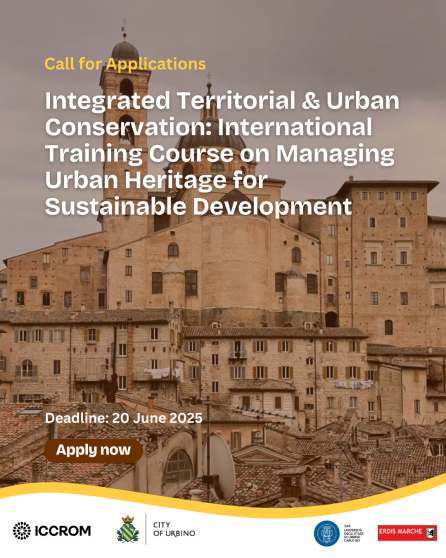Organizers: ICCROM and the Municipality of Urbino, in collaboration with the Università degli Studi di Urbino Carlo Bo and ERDIS Marche
Historic cities face growing threats from disasters, pressures from tourism and development and environmental changes. Addressing these challenges requires integrated strategies that bridge heritage conservation with urban planning, risk management, and long-term development.
The Historic Center of Urbino, a UNESCO World Heritage site in central Italy, presents a unique opportunity for examining these issues. Renowned for its Renaissance urban layout and architecture, Urbino also exemplifies many challenges and opportunities associated with the management of medium-sized historic cities.
ICCROM and the Municipality of Urbino are pleased to announce “Integrated Territorial & Urban Conservation (ITUC) – Managing Urban Heritage for Sustainable Development”; a specialized international course aimed at equipping heritage and planning professionals with the tools and methodologies to safeguard urban heritage and enhance its role in fostering sustainable and resilient development and improving the quality of lives of local residents.
This two-week course is part of ICCROM’s Urban Heritage for Sustainable Development (UH4SD) initiative, which fosters peer-to-peer learning and the exchange of best practices among historic cities, including those on the World Heritage List. The course is implemented in collaboration with the ICCROM-IUCN World Heritage Leadership Programme.
The course content covers relevant topics, such as:
- Mapping and assessing urban heritage attributes and values
- Impact Assessment for urban heritage (IA)
- Disaster Risk Management (DRM) and Climate Resilience for Historic Cities
- Legal Frameworks & Multi-Level Urban Governance
- Social and Economic Regeneration of Historic Cities
- Digital Tools in Urban Heritage Management
- Public Participation and Actors’ Engagement
The content of the course will be delivered through interactive lectures and hands on field work and exercises. During the course, participants will engage with various stakeholders to explore how integrated territorial and urban planning can strengthen heritage conservation and resilience while benefiting local communities.
Target Groups
ITUC-2025 is open to 15-20 professionals from around the world, who are actively engaged in urban heritage conservation and management.
The key selection criteria for participants will include:
- Professionals in the fields of heritage conservation, urban planning, regional planning, or closely related disciplines, especially those working with municipalities or urban local bodies
- Site managers working at historic cities and urban areas inscribed on the World Heritage List
- Professionals involved in activities related to the course topic and experience in the heritage field
- Quality of submitted application forms
- Proficiency in English
Learning Outcomes
The course will equip the participants to gain knowledge, skills and practical experience to improve heritage management in their home contexts. Upon completion of ITUC 2025, participants will be able to:
- Implement impact assessments (IA) for proposed projects and actions in an urban context.
- Manage disaster risks by integrating heritage-sensitive mitigation strategies with civil protection plans and land-use regulations.
- Develop climate adaptation and mitigation strategies in historic urban context
- Develop innovative strategies for social and economic regeneration of historic towns and their territories.
- Align heritage management with urban and regional planning instruments and national policies & legislations.
- Advanced digital tools for urban heritage management.
- Foster the establishment of inclusive governance models that adequately consider heritage management needs while also ensuring the provision of economic and social needs, and engage local communities, businesses, policymakers, and NGOs in decision-making on urban heritage management.
The outcomes will enable participants of the course to serve as catalysts for change, integrating heritage-sensitive approaches into broader urban planning and development initiatives in their respective cities or regions.
Application Deadline: 20 June 2025
Course dates: 15-27 September 2025 (excluding travel dates)
Course fee: free
Travel, Accommodation, and Expenses
Participants are responsible for their travel expenses to and from Italy, as well as local transportation to and from Urbino. Accommodation and meals during the course will be provided by the organizers.
Application Process
Interested applicants should submit their application by completing the online application form in English by 20 June 2025, including:
- a personal photo
- a brief version of your professional curriculum vitae highlighting your most relevant experience (in English; maximum two pages)
Allowed formats: pdf, doc, docx, jpg, jpeg, png, tif, tiff; maximum file size 5 MB.
If you encounter any issues submitting your application via the ICCROM website, please email us at: ituc2025@iccrom.org.

